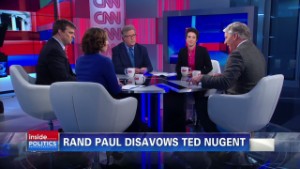Editor's note: Timothy Stanley is a historian at Oxford University and blogs for Britain's The Daily Telegraph. He is the author of "The Crusader: The Life and Times of Pat Buchanan."
(CNN) -- When did conservatives become prisoners to idiotic vulgarity? I ask that question as someone who self-defines as conservative and who is sick and tired of being embarrassed by Ted Nugent.
Last month the aged rocker called President Barack Obama a "subhuman mongrel" in an interview with Guns.com. That was bad enough, but what was just as shocking was the willingness of Texas GOP gubernatorial nominee Greg Abbott to keep him aboard his campaign.
Rick Perry and Ted Cruz also failed to rule out appearing with him. Only Rand Paul took to Twitter to demand an apology, which Nugent eventually gave. He downgraded Obama to a "liar," which is, at least, a more colorblind insult.
 Timothy Stanley
Timothy Stanley There is a view that Nugent simply "speaks his mind," and, yes, he has every constitutionally guaranteed right to do so. Maybe what he says appeals to some people, those for whom good manners are a bourgeois affectation and correct spelling the preserve of Harvard pointy-heads.
Either way, what is disturbing is that some serious Republican politicians think that he matters and are happy to count him among their endorsements -- as though selling records and getting angry make him a spokesman for the masses. Animal from the Muppets also speaks his mind, but we've yet to see him headlining a rally for Chris Christie.
This isn't what conservatism is supposed to be about. Conservatism is the rejection of ideology in favor of common sense and anger in favor of cool rationalism.
 'Inside Politics' panel on Paul, Nugent
'Inside Politics' panel on Paul, Nugent Of course, there have always been intemperate voices on the American right -- from Joe McCarthy to the John Birch Society. (I'm not including Southern Democratic racists such as George C. Wallace because their place on the political compass is impossible to plot.) But the American right has an intellectual tradition that has all been forgotten by the media in recent years.
There were the Progressive Republicans (Irving Babbitt), the anti-communists (Whittaker Chambers), the libertarians (Ayn Rand, Milton Friedman), the traditionalists (Russell Kirk), the neo-conservatives (Leo Strauss), and the sages of the National Review (James Burnham, L. Brent Bozell, Willmoore Kendall) -- the latter embodied by the urbane, cosmopolitan wit of William F. Buckley.
Most of these groups quietly linger around today, largely ignored in the noisy mess of 21st-century politics but still patiently taught at some colleges and think tanks. In modern-day Washington, you'll find all the Catholic Republican interns spending Sunday at St. Stephens on Pennsylvania Avenue and weekday nights at lectures by bishops on the nature of good and evil. Not at the assault weapon firing range.
Sometime in the 1970s, the intellectual right made common cause with populism, and historians such as Rick Perlstein tell us that this is when they surrendered their brains to cultural conservatism. But Ronald Reagan was neither inarticulate nor rude. He was happy, sunny, funny, and his speeches so dense with philosophy and history that they make Obama sound like a high school student.
Crucially, he had a faith in the intelligence of the average American, which meant he didn't resort to meanness or bad syntax to win their vote. Reagan would never call an opponent "subhuman."
So how do we explain the rudeness of contemporary politics? Nugent's followers might insist that his language reflects the desperate seriousness of his cause, that any conversation about fundamental issues such as guns or Obamacare is bound to cause a loss of temper. But in the 1960s the Republicans were debating urban riots, sex, drugs and Vietnam -- and yet the GOP sold itself as a party that could resolve these challenges with calm sensibleness. Nixon ran as an antidote to the chaos caused by the left, offering order over anarchy.
"This pursuit of the base ends with basically intelligent men deferring to those who are rightly socially unacceptable."Timothy Stanley
What has changed is that back then conservative politicians had faith in themselves and their own philosophy, that it would win out because it was right and middle-class Americans could see that.
Today's breed are all too often chasing a "base" that, they imagine, includes yahoos, survivalists and people who think the world is both flat and about to come to an end. This pursuit of the base ends with basically intelligent men deferring to those who are rightly socially unacceptable.
Cue John McCain in 2008 being told by supporters that Obama is an Arab, or Mitt Romney nearly paralyzed with socially awkwardness as he courted the Joe Six-Packs in 2012. And it ends in politicians failing to call Nugent out for being a Neanderthal.
As the midterms approach, conservative presidential aspirants face this challenge: Can they elevate rather than reduce the political debate? Rand Paul has made a good start, and it's probably because he is driven by philosophy and all the self-assurance that brings. For the rest, I'd like to see them defy a few stereotypes. Rather than being photographed shooting bears or doing pushups with Chuck Norris, let journalists catch them reading a book. Russell Kirk is a good place to start.
Follow us on Twitter @CNNOpinion.
Join us on Facebook/CNNOpinion.
{ 0 comments... read them below or add one }
Post a Comment